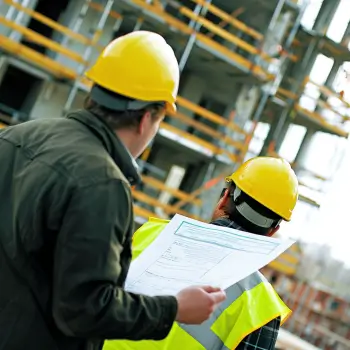Construction project managers are responsible for detailed project planning, stakeholder collaboration, budget management, scheduling, and quality control.
Their role involves creating project plans, mitigating risks, and maintaining financial control through budgets. Strong communication and negotiation skills are crucial for successful permit acquisition and stakeholder engagement.
Budget management includes identifying potential overruns and implementing cost-saving initiatives.

Quality control guarantees adherence to standards and timely project completion. From planning to execution, construction project managers play an essential role in project success.
Key Takeaways
- Develop detailed project plans with tasks and timelines.
- Collaborate with stakeholders for alignment and success.
- Utilize negotiation skills for securing agreements.
- Ensure legal compliance through the permit acquisition process.
- Maintain financial control with detailed budgets.
Key Responsibilities
The key responsibilities of a construction project manager encompass a range of critical tasks, including project planning strategies, stakeholder collaboration techniques, contract negotiation skills, and the permit acquisition process.
These key duties are essential for ensuring the successful execution of construction projects, from initial planning to final completion.
A construction project manager’s proficiency in these areas greatly contributes to the timely and cost-effective delivery of projects within the construction industry.
Project Planning Strategies
Effectively developing thorough project plans is an essential responsibility for a Construction Project Manager to ensure the successful execution of construction projects.
Project planning strategies involve the professionals creating detailed plans that outline tasks, timelines, and required resources.
Collaboration with stakeholders ensures alignment with project goals. Risk mitigation strategies are implemented during the planning phase to anticipate and address potential issues.
Detailed budgets and cost estimates are vital for tracking expenses and maintaining financial control.
Clear communication channels are essential for keeping all team members informed and aligned throughout the project planning process.
Team alignment is key to successful project execution, making it imperative for Construction Project Managers to employ effective project planning strategies.
Stakeholder Collaboration Techniques
Construction project managers utilize various techniques to effectively collaborate with stakeholders, such as engineers, architects, and clients, to determine project specifications.
Effective stakeholder collaboration techniques involve clear communication, active listening, and building strong professional relationships.
By engaging in open dialogue and understanding the needs and expectations of all parties involved, construction project managers can align project goals, expectations, and deliverables.
This collaboration ensures future project success by fostering a shared understanding of the project scope and requirements.
Additionally, negotiation skills are important in obtaining permits and licenses to guarantee complete legal compliance throughout construction.
Maintaining positive and proactive communication with stakeholders is essential for achieving project milestones and delivering successful outcomes within the specified timeframes and budgets.
Contract Negotiation Skills
Strong contract negotiation skills are crucial for Construction Project Managers to secure profitable agreements with external vendors.
Negotiating contracts involves aligning project specifications with agreed-upon terms and obtaining permits and licenses for timely completion. It is a key responsibility that demands attention to detail to safeguard the company’s interests effectively.
Successful negotiation guarantees cost savings and paves the way for overall project success. By honing their negotiation skills, project managers can navigate the complexities of contractual agreements, leading to efficient project execution and satisfactory outcomes.
In the construction project manager roles and responsibilities PDF, this ability to negotiate effectively stands out as a critical component in driving project success and maintaining positive vendor relationships throughout the construction process.

Permit Acquisition Process
Negotiating contracts with external vendors is essential for Construction Project Managers. A key aspect of their role involves overseeing the permit acquisition process to guarantee compliance with local regulations and codes.
Construction project managers must ensure that all necessary permits are acquired to meet local building codes and regulations.
This process entails coordinating with government agencies, submitting required documentation for approval, and ensuring legal compliance. If permits are not acquired promptly, project timelines can be delayed.
As a result, successful permit acquisition is vital for the smooth progress of construction projects.
By effectively managing the permit acquisition process, construction project managers contribute to the overall success and timely completion of construction projects while adhering to legal requirements and ensuring regulatory compliance.
Project Planning
In project planning, engineering and construction project managers focus on timeline management to develop detailed schedules that outline tasks, timelines, and milestones.
Additionally, they prioritize resource allocation to make certain that the necessary manpower and materials are available when needed for project execution.
Timeline Management
Efficient timeline management in construction projects demands meticulous planning and continual monitoring to guarantee the project progresses according to schedule.
Construction project managers overseeing timeline management must create detailed schedules encompassing tasks, milestones, and deadlines.
They guarantee adherence to the project timeline, promptly identify potential delays, and implement corrective actions when necessary.
Effective timeline management involves close coordination with stakeholders to ensure the timely completion of different project phases.
Project managers must regularly monitor progress, adjust schedules as needed, and promptly communicate any timeline changes to the project team and stakeholders.
Leveraging project management software can facilitate progress tracking and reporting, bottleneck identification, and optimal project timeline optimization for successful completion.
Resource Allocation
Careful project planning involves strategically allocating resources, including labor, materials, and equipment, to guarantee the successful execution and timely completion of construction projects.
In construction project management, the manager oversees resource allocation to ensure efficiency, control project costs, maximize productivity, achieve and maintain quality standards.
Regular monitoring of the resource allocation process is crucial for adapting to changes, resolving conflicts, and addressing unexpected challenges that may arise during the project.
The table below highlights the key aspects and importance of resource allocation in construction project planning:
Resource Allocation in Construction Project PlanningKey AspectsImportanceEfficient resource distributionControl project costsOptimize productivityMaximize efficiencyMaintain quality standardsEnsure project successRegular monitoring and adjustmentsAdapt to changes and resolve conflicts
Budget Management
Construction Project Managers play a crucial role in managing project budgets efficiently. They employ various cost-tracking methods to monitor expenses and uphold financial accountability.
Budget allocation strategies are also implemented to optimize resources and maintain project financial health.
Cost Tracking Methods
How do construction project managers effectively monitor and manage project expenses throughout the project lifecycle?
Cost tracking methods in construction project management involve consistently monitoring expenses such as labor, material, equipment, and other project-related expenses.
By utilizing specialized cost-tracking tools, project managers can promptly guarantee accurate budget management and identify potential budget overruns.
This proactive approach enables them to take necessary corrective actions to the risks and keep the project financially on track.
Common methods like spreadsheets, project management software, and specialized cost-tracking tools play a crucial role in this process, allowing for efficient monitoring and control of expenses to ensure projects are completed within the allocated budget constraints.
Budget Allocation Strategies
What key strategies do construction project managers employ to allocate budgets for project expenses effectively?
Construction project managers utilize various budget allocation strategies to ensure financial control and cost-saving measures throughout the project.
They develop detailed budget plans that outline the allocation of funds for materials, labor, equipment, and overhead costs in each phase of the construction project.
Project managers can negotiate prices with vendors to stay within budget constraints by closely monitoring budget expenditures and making necessary purchasing adjustments.
Implementing cost-saving initiatives while maintaining quality is important in budget management.
Effective budget allocation helps control expenditures and plays an important role in delivering projects on time and within the approved budget limits.
Stakeholder Communication
Effective stakeholder communication is paramount for a construction project manager to guarantee that project requirements are clearly understood and successfully met. Stakeholder communication involves various key aspects:
- Regular progress reports to keep all parties informed.
- Addressing concerns or issues promptly to prevent delays.
- Building relationships through transparent communication to manage expectations and resolve conflicts efficiently.
Engaging stakeholders, including clients, contractors, suppliers partners, and regulatory bodies, ensures project alignment and success.
Clear communication is important in maintaining project cohesion, reducing misunderstandings, and fostering a collaborative environment.

Quality Control
Maintaining specified quality standards is critical to construction project management. It requires vigilant oversight and adherence to established protocols and procedures.
Quality control in construction projects involves monitoring work progress to identify deviations from standards and preventing defects, delays, and the need for rework.
Testing materials, conducting inspections, and maintaining thorough documentation are key components of quality control efforts.
By implementing effective quality control measures, construction workers and project managers contribute to successfully completing projects within budget and timeline constraints.
Ensuring that all work meets the required quality standards enhances the overall project outcome and helps build a reputation for delivering high-quality results in the construction industry.
Quality control is a fundamental pillar of successful construction project management.
Frequently Asked Questions
What Is the Role of a Construction Project Manager?
A Construction Project Manager supervises project planning, the creation, resource allocation, and communication to guarantee successful construction projects.
They collaborate with stakeholders, manage budgets, supervise teams, and ensure projects are completed on time and within budget.
What Are 5 Job Responsibilities of a Project Manager?
A project manager’s key responsibilities include leading teams for project completion team management, managing budgets for financial control, coordinating resources for productivity, planning timelines for progress tracking, and overseeing workforce management for a skilled team.
What Does a Construction Project Manager Do daily?
A Construction Project Manager supervises daily construction site activities, guarantees progress aligns with schedules and quality standards, coordinates with subcontractors and suppliers for timely resources, reviews project plans and budgets, conducts site inspections, and communicates effectively with stakeholders.
What Is the Job Description for a Construction Project Manager Template?
A construction project manager’s job description outlines responsibilities such as collaborating with stakeholders, negotiating contracts, obtaining permits, planning and supervising projects, and ensuring timely and within-budget delivery.
It involves leading teams, managing budgets, resources, timelines, and overall project success.

Conclusion
The role of a Construction Project Manager encompasses a wide range of responsibilities, from project planning and budget management to stakeholder communication and quality control.
With a keen attention to detail and a thorough understanding of construction processes, a Construction Project Manager plays a crucial role in ensuring the successful execution of construction projects.
By effectively coordinating various aspects of the project and adhering to regulatory requirements, a Construction Project Manager contributes immensely to the timely completion and overall success of construction endeavors.

Chris Ekai is a Risk Management expert with over 10 years of experience in the field. He has a Master’s(MSc) degree in Risk Management from University of Portsmouth and is a CPA and Finance professional. He currently works as a Content Manager at Risk Publishing, writing about Enterprise Risk Management, Business Continuity Management and Project Management.

